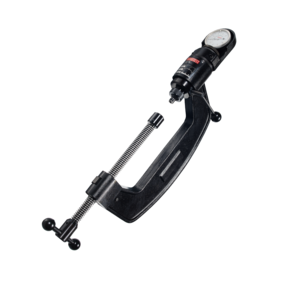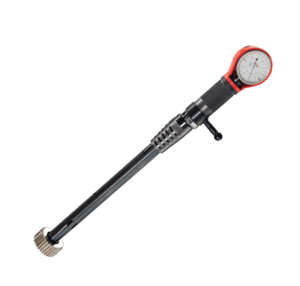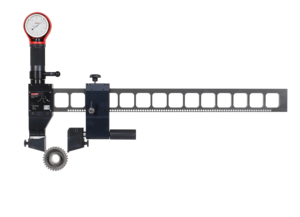Rockwell Hardness Tester
ZwickRoell Rockwell hardness testers are used for classic Rockwell methods, superficial Rockwell methods on metals, and depth measurement methods, such as ball indentation tests on plastics.
With a Rockwell hardness tester, you can measure the residual indentation depth created by the indenter using a differential depth method. The deeper a defined indenter penetrates the surface of a specimen with a specified test load, the softer the material being tested. The most widely used Rockwell hardness test methods are standardized test methods on metals according to ASTM E18 and ISO 6508. In the plastics industry, these include the Rockwell hardness test to ISO 2039-2 and ASTM D785, as well as the ball indentation hardness test to ISO 2039-1.
Stationary Rockwell hardness testing machines Portable Rockwell hardness testing machines Test methods
What distinguishes a Rockwell hardness tester?
A Rockwell hardness tester is designed to test the hardness of materials using the differential depth method.
A typical Rockwell hardness testing machine consists of a load application feature, an indenter, a test anvil and a measuring transducer. The DuraJet, ZHR Touchscreen and ZHR8150CL models are software controlled hardness testing machines with automatic closed loop load application and fully automatic indentation evaluation. The ZHR instrument operates with a dead weight system.
With the software-controlled instruments you have access to a wide range of functions, including the use of templates, export of your results and much more.
The Rockwell hardness test has a variety of applications. It is not only used to determine material properties according to hardness and forming processes, but also for quick and effective testing in production and incoming goods departments. This helps ensure that the material meets specified requirements and will behave optimally when used for its intended application.
In the development of our ZwickRoell Rockwell hardness testers, we particularly take the following aspects into account:
- High precision and durability
- Easy and intuitive operation that minimizes operational errors
- Future-proof testing software
How does a Rockwell hardness tester work?
A Rockwell hardness tester uses a cone-shaped diamond to indent the material being tested. After application of the preload is complete, the main load is applied in precise accordance with the specified time frame. Then, once the main load has been removed, the difference in the depth at which the cone penetrated the material is measured and the hardness value is calculated.

Portable Rockwell hardness tester for metals
Our portable Rockwell hardness testers in a load range of 15 to 187.5 kg are the product of over 65 years’ experience. They have proven themselves in many branches of industry for decades.
- At the core of every portable Rockwell hardness tester is the reliable spring sleeve unit for load application.
- The hardness value is indicated on an analog dial gauge.
- Applications for these portable hardness testers range from the simple measurement of sheet metal to the performance of hardness tests on tooth flanks and drill holes.
Comparison of portable Rockwell hardness tester versions
 |  |  | |||||
| N4A | N4B | N4C | N4E | N6 | N7F | N7P | |
| Load range | 15-187.5 kg | 15-187.5 kg | 15-187.5 kg | 15-187.5 kg | 62.5 kg | 62.5 kg | 62.5 kg |
| Display | Analog | Analog | Analog | Analog | Analog | Analog | Analog |
| Device type | Testing clamp | Testing clamp | Testing clamp | Testing clamp | Hardness tester in bores | Tooth flank tester | Tooth flank tester |
| Test area | Throat depth: 85 mm, clamping width: 0-145 mm | Throat depth: 130 mm, clamping width: 0-235 mm | Throat depth: 180 mm, clamping width: 0-335 mm | Throat depth: 110 mm, clamping width: 0-20 mm | Drilling diameters from 36-110 mm, insertion depth up to 400 mm | External teeth module 2-10, measuring range up to 140 mm | External teeth module 3-35, measuring range up to 700 mm |
N4 testing clamp
The portable Rockwell hardness tester has a clamping device consisting of a light alloy clamping clip with quickly adjustable threaded spindle and clamping toggle. Depending on the customer request, you can select between the test unit N1A 001 with spring sleeve or one of the load adjustable test units.
Applications:
- All Rockwell methods to EN ISO 6508, ASTM E18
- Non-standard methods in Brinell HBT in a load range of 294-1,839 N (30-187.5 kg)
Versions:
- N4A 000 throat depth 85 mm clamping width 0-145 mm
- N4B 000 throat depth 130 mm clamping width 0-235 mm
- N4C 000 throat depth 180 mm clamping width 0-335 mm
- N4E 000 throat depth 110 mm clamping width 0-20 mm
Load adjustable test units: (capacity reduction by 55 mm)
- N1P 000 – for plastics testing to EN ISO 2039-1(5, 13.5, 36.5, 98 kg)
- N1R 000 – for Rockwell testing to EN ISO 6508 (60, 100, 150 kg)
- N1S 000 – for Super Rockwell testing to EN ISO 6508 (15, 30, 45 kg)
Test process:
- The testing instrument is placed on the workpiece and clamped in a force-fit manner at the desired test point between the test unit and the test anvil.
- After the clamping process, the test load is applied using a hand lever.
- The test result is then read off the dial gauge.
N6 - Hardness testing in drill holes
All devices consist of test unit N1E 000 with load lever (complete with dial gauge, dial
gauge cover and spring sleeve) and Intest sensor with tensioning nut, clamping clip and spring link, including test specimen. The hardness tester is delivered in a suitable instrument case with a hardness comparison table and operating instructions.
Applications:
- Portable hardness tester for measurements in drill holes
- Drill hole diameter from 36-110 mm
Test process:
- The testing instrument is positioned in the hole and secured via force-fit clamping.
- After the clamping process, the test load is applied using a hand lever.
- The test result is then read off the dial gauge in HRC values.
N7 - Tooth flank tester
Tooth flank testers consist of test unit N1E 000 with load lever (complete with dial gauge, dial gauge cover and spring sleeve), the measurement head with built-in spring link, including hardness testing diamond and the clamping device. The standard design consists of a load level 62.5, HRC hardness value indicator, tool kit, hardness comparison table, device case and instruction manual.
Applications:
- Portable hardness tester for hardness measurement of tooth flanks.
Versions:
- N7F 000 application range: External teeth module 2-10, max. tooth measurement width 140 mm
- N7P 000 application range: External teeth module 3-35, max. tooth measurement width 700 mm
Test process:
- The testing instrument is placed on the workpiece and clamped at the desired test point.
- After the clamping process, the test load is applied using a hand lever.
- The test result is then read off the dial gauge.